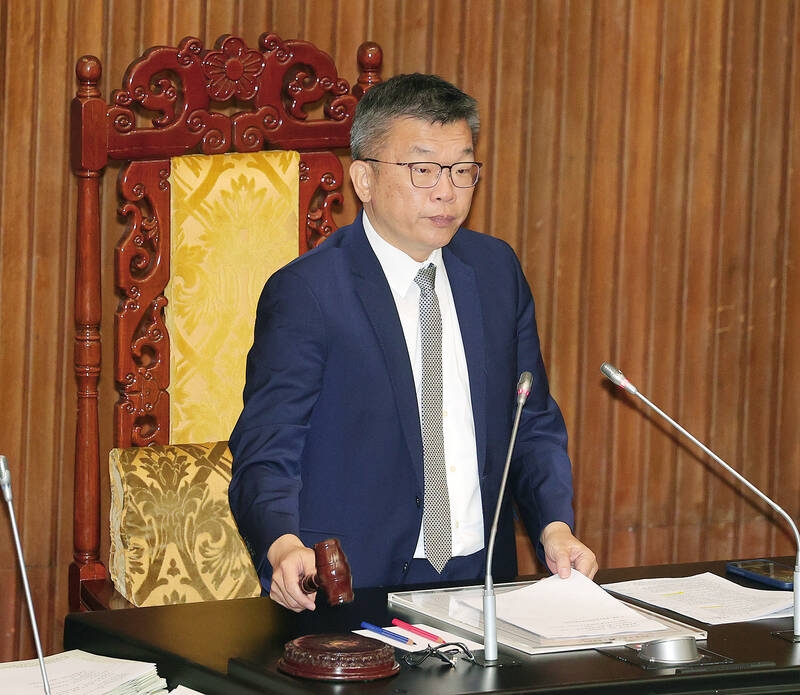People using computer-generated images, voices and magnetic records to commit fraud could be sentenced up to seven years in prison and fined a maximum of NT$1 million (US$32,462) after the Legislative Yuan yesterday passed a third reading of an amendment to Article 339-4 of the Criminal Code.
The amendment was approved unanimously and is to take effect after it is promulgated by the president.
Currently, Article 339-4 states that people convicted of fraud could be imprisoned between one and seven years if they committed the offense in the name of a government agency or public official without authorization, with three or more people, or by dissemination of false information to the public via radio, television, Internet or other media.

Photo: CNA
They may be fined no more than NT$1 million.
“Images, voices and magnetic records created by computers and artificial intelligence [AI] technologies are easy to disseminate, and it has become increasingly difficult to distinguish between real and fake ones. Should scammers take advantage of the technology, the impact on society would be greater compared with other types of fraud. As such, it is necessary to impose heavier punishment on offenses committed through AI or other advanced technologies,” officials said.
Lawmakers also passed a third reading of an amendment to the Personal Data Protection Act (個人資料保護法), which imposes tougher sanctions on private corporations that fail to take protective measures, leading to personal data breaches.
The amendment was proposed in view of rising personal data breaches in the private sector and to address issues of oversight over personal data management, the National Development Council (NDC) said.
The amendment was also drafted in compliance with a ruling handed down by the Constitutional Court last year, which tasked the government with establishing an independent oversight agency to be in charge of personal data protection affairs, the council said.
The court also ordered that a separate agency be established to address privacy issues when the government implements the National Human Rights Action Plan.
Once the amendment takes effect, individuals and non-
government organizations that keep personal data and fail to take appropriate security measures, resulting in personal data being stolen, altered, damaged, lost or leaked, would be fined NT$20,000 to NT$2 million and ordered to rectify the situation within a designated period.
If no improvement is made or it is a serious data breach, a fine of NT$150,000 to NT$15 million would be imposed.
They would be subject to punishment until the situation is rectified.
The amendment to the Personal Data Protection Act is part of the bills that the government would use to crack down on fraud, along with amendments to the Criminal Code, the Human Traffic Prevention Act (人口販運防制法), the Money Laundering Control Act (洗錢防制法), and the Securities Investment Trust and Consulting Act (證券投資信託及顧問法).
NDC Minister Kung Ming-hsin (龔明鑫) earlier this month said that a preparatory office of the Personal Data Protection Committee is to be established in August.
However, the committee’s organic act has to be reviewed and passed by the legislature before it could begin operations, he said.

A Ministry of Foreign Affairs official yesterday said that a delegation that visited China for an APEC meeting did not receive any kind of treatment that downgraded Taiwan’s sovereignty. Department of International Organizations Director-General Jonathan Sun (孫儉元) said that he and a group of ministry officials visited Shenzhen, China, to attend the APEC Informal Senior Officials’ Meeting last month. The trip went “smoothly and safely” for all Taiwanese delegates, as the Chinese side arranged the trip in accordance with long-standing practices, Sun said at the ministry’s weekly briefing. The Taiwanese group did not encounter any political suppression, he said. Sun made the remarks when

The Taiwanese passport ranked 33rd in a global listing of passports by convenience this month, rising three places from last month’s ranking, but matching its position in January last year. The Henley Passport Index, an international ranking of passports by the number of designations its holder can travel to without a visa, showed that the Taiwan passport enables holders to travel to 139 countries and territories without a visa. Singapore’s passport was ranked the most powerful with visa-free access to 192 destinations out of 227, according to the index published on Tuesday by UK-based migration investment consultancy firm Henley and Partners. Japan’s and

BROAD AGREEMENT: The two are nearing a trade deal to reduce Taiwan’s tariff to 15% and a commitment for TSMC to build five more fabs, a ‘New York Times’ report said Taiwan and the US have reached a broad consensus on a trade deal, the Executive Yuan’s Office of Trade Negotiations said yesterday, after a report said that Washington is set to reduce Taiwan’s tariff rate to 15 percent. The New York Times on Monday reported that the two nations are nearing a trade deal to reduce Taiwan’s tariff rate to 15 percent and commit Taiwan Semiconductor Manufacturing Co (TSMC, 台積電) to building at least five more facilities in the US. “The agreement, which has been under negotiation for months, is being legally scrubbed and could be announced this month,” the paper said,

Japan and the Philippines yesterday signed a defense pact that would allow the tax-free provision of ammunition, fuel, food and other necessities when their forces stage joint training to boost deterrence against China’s growing aggression in the region and to bolster their preparation for natural disasters. Japan has faced increasing political, trade and security tensions with China, which was angered by Japanese Prime Minister Sanae Takaichi’s remark that a Chinese attack on Taiwan would be a survival-threatening situation for Japan, triggering a military response. Japan and the Philippines have also had separate territorial conflicts with Beijing in the East and South China